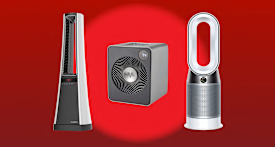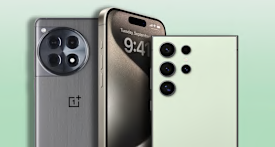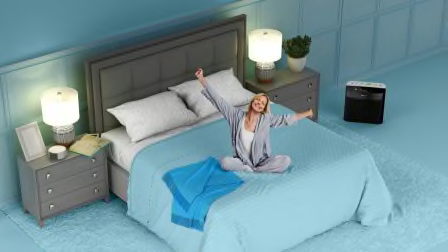Best Sunrise Alarm Clocks of 2024
If you’re tired of being jolted out of bed by your current alarm, a dawnlike wake-up light just might brighten your mornings in more ways than one. Here’s our take on five popular models.

Whether you struggle to get a good night’s sleep or are simply not a morning person, a sunrise alarm clock could be your new best friend.
Sunrise alarm clocks gently emit light at your designated time, glowing ever brighter like the rising sun, with the goal of gently rousing you from your slumber. Many give you the option of replacing the jarring sounds of a typical alarm clock with pleasant nature sounds, such as chirping birds, wind chimes, or even glorious silence. In short, they’re designed to create a natural-feeling alternative to the rude awakening offered by a conventional clock.
“Light is responsible for regulating our sleep-wake cycles,” explains Dr. Nilong Vyas, a board-certified pediatrician, sleep coach, and founder of the family sleep consulting service Sleepless in NOLA. “The type of light and the amount of lux [a measure of illuminance an object produces] can stimulate the retina of the eye and give signals to the body that it is time to wake up or go to sleep.”
Bright light signals the brain that it’s time to wake, even when your eyes are closed; dim or no light has the opposite effect. That’s why sleep doctors suggest that if you feel sleepy at wake-up time, you should pull up your shades or, even better, get outside and reap the benefits of daylight.
Sunshine triggers your circadian rhythm to start off on the right foot and syncs your brain to a 24-hour cycle—one in which you feel alert and energized to start your day in the morning and ready to wind down by bedtime. You can, of course, leave your shades up and wake up with the sun. However, not everyone has sufficient light streaming into their bedroom), and depending on the time of year, relying on the sun might mean you’ll wake up earlier or later than you want to.
@consumerreports Tired of being jolted out of bed by your current alarm? See the best sunrise alarm clocks from our tests through the link in our bio. #sunrisealarmclock #alarmclock #sleeptok
♬ original sound - Consumer Reports
Best Sunrise Alarm Clocks
To make a fair comparison, we limited our roundup to stand-alone devices with a clock interface. Ultimately we landed on popular models from six brands: hOmelabs, iHome, JALL, La Crosse, Lumie, and Philips. All have backup-battery capabilities (though a battery may or may not be included) that saves the clock’s time and alarm settings in case of a power outage, or if the clock is accidentally unplugged.
Here, we list the clocks in order of how they fared in our evaluation, from most to least user-friendly. (This test did not assess brightness levels or light color or quality of the audio.) Prices below are approximate and may change.



















